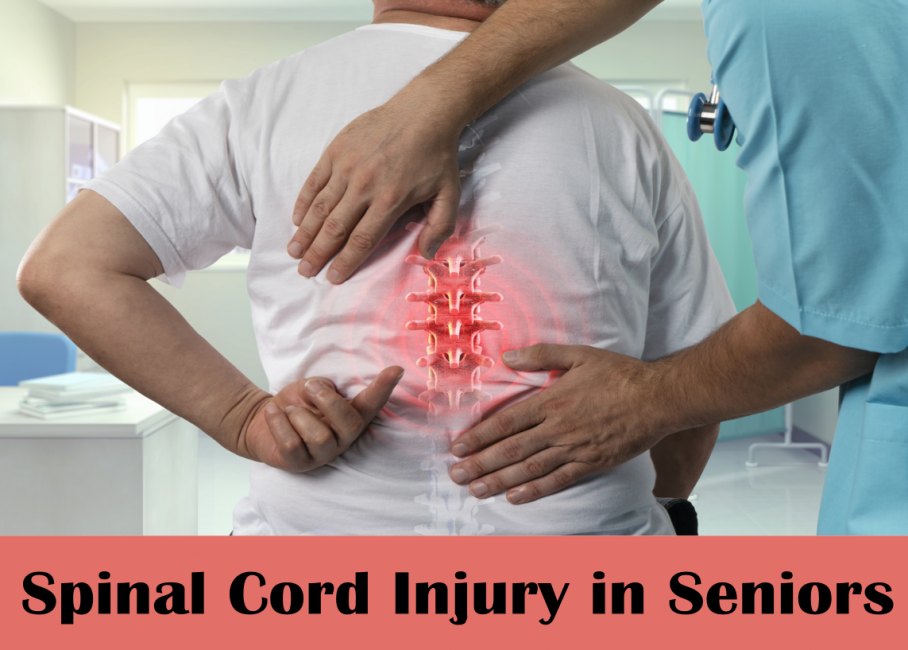
During the past 3 decades, the number of Spinal Cord Injuries (SCIs) in seniors has increased five times, as compared with younger patients. Spinal Cord injuries are serious physical trauma which is most likely to have a significant impact on a senior’s life. Spinal cord injuries mostly affect the elderly and especially men. Close to 60% of these injuries are sustained through falls and other factors include infections, tumores and pre-existing seniors.
Spinal cord is basically a group of nerves and other tissues that the vertebrae of the spine contains. The bones of the vertebrates are stacked upon each other to make up the spine. The nerves brain to the ending of the buttocks through the spinal cord which also protects it. The main responsibility of the spinal cord is sending and receiving messages from the brain to all the parts of the body and vice versa.
Common causes of Spinal Cord Injury in Seniors
Spinal cord injuries mostly occur due to falls in seniors. Some of the other means of spinal cord injuries are:
Vehicle accidents
Jumping from significant height
Injuries during sporting events
Electrical accidents at home
Severe twisting of the middle part of the body
Acts of violence
Symptoms of Spinal Cord Injury in seniors
Some of the common symptoms of spinal cord injuries in seniors include:
Walking problems
Inability to move
No control over bladder or bowels
Numbness for prolonged periods
Repeated signs of shock
Unconsciousness
Headaches
Pain or stiffness in back and neck area
It is advisable to check with your healthcare provider if you are experiencing any of these above symptomes.
Prevention of Spinal Cord Injuries in Seniors
Prevention is better than cure. The same also applies for spinal cord injuries. Since these injuries occur due to unforeseen events, the best way to prevent it is to reduce the risks. Some of the tips and advices to follow are,
Keep your homes clean and fall proof. Install handrails and grab bars around the house if needed.
Wear proper protective gear while playing sports
Avoid jumping into water before examining it’s depth and free of rocks
Wear a seatbelt while driving a car to safeguard yourselves
Strictly avoid driving under the influence of alcohol
Never move someone who you suspected spinal cord injury. Let the emergency professionals take care of the injured person.
Risk Factors of Spinal Cord Injury in seniors
Although a spinal cord injury can happen to anyone, there are certain risk factors that may contribute to a higher risk of spinal cord injury. Some of them are,
Being male. That’s true. Females contribute only about 20% of spinal cord injuries. Being male, seniors have higher chances of injury
Being between 16-30 and 65+. This is the period where you are most likely to face a traumatic spinal cord injury. Most of them occur to seniors and falls are the most common cause in seniors.
Engaging in extreme sports. Diving into shallow water, extreme sports like bungee jumping, paragliding, etc. Not wearing proper safety gear can also lead to spinal cord injuries.
Bone or Joint disorder. Spinal Injury can also come through joint and bone disorder. With these complications, even a simple minor injury can cause a spinal cord injury in seniors.?
Complications of Spinal Cord Injury in Seniors
A spinal cord injury can affect every region of a senior’s life. Some of the most ofen affected areas include:
Bladder Control
Your kidney and bowels will continue to work as usual. However your brain will not be able to control the bladder due to lack of a message carrier by the spinal cord. This can lead to and increase the risk of urinary tract infections. If not properly dealt with these issues, it might lead to kidney or bladder stones.
Loss of skin sensation
Depending on the impact of the injury, the senior might have lost part of or most of their skin sensation. Therefore, a bedsore or pressure ulcer can easily be created without the knowledge of the senior. Feelings like prolonged pressure, cold or heat can not be transferred to the brain
Respiratory System
Breathing and coughing becomes hard with a spinal cord injury. Since the muscles in the abdominal and chest muscles are affected. Here also, it depends on the level of injury faced by the senior. Severe respiratory problems can lead to pneumonia and lung problems.
Sexual health
Sexual functions may be affected by a spinal cord injury. Men may notice changes in erection and ejaculation; women can feel changes in lubrication.
Severe Pain
People can experience pain in muscles and joints from simple use of the body. Nerve pains also occur in seniors with spinal cord injury. This pain also can easily lead seniors into depression.
Conclusion
Spinal cord injuries can occur to anyone at any time. Some seniors lead productive lives after injury, but some with severe injury might need assistive devices and rehabilitation care. Some seniors might also face paralysis and loss of mobility. They are easy to prevent with proper care and planning. It is not advisable to live with constant fear of spinal cord injury, rather be aware of what might cause them and make your home senior friendly to avoid any accidents. You might save a life!
Author: Team 60Plus India
Keywords used : Spinal Cord Injuries, SCIs, Spinal Cord Injuries in seniors - Symptoms, Preventions and Complications.
Hashtags : #spinalcord #spinalcordinjury #SCI #seniors #falls #accidents #causes #symptomes #mobility #pain #prevention #protectivegear #risks #male #joints #complications #seniorcitizens #wecare #60PlusIndia